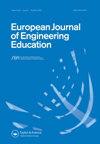获取、学习和交流意义的语言和学科素养:学生从学校过渡到一年级工程本科的经历
IF 2.8
Q2 EDUCATION & EDUCATIONAL RESEARCH
引用次数: 0
摘要
摘要语言使用是获取、学习和交流对本科生工程知识理解的核心。在从学校到大学一年级的过渡过程中,有必要了解学生对语言使用的体验、解释和期望——概念化为语言和学科素养的相关概念。我们采访了九名机械工程一年级的学生,将这种转变描述为一个在复杂的连续体中来回导航的过程。所有学生都经历了一个不加批判的社会化过程,进入了工程专业。然而,对一些人来说,驾驭这一连续体更为困难,这一过程是通过他们的语言曲目和教育经历而变化的,但也有代理性和个人性。学生们发现没有机会将他们的知识、语言和身份带到这个过程中。这些发现和我们的概念工具在更广泛的辩论中得到了支持,这些辩论涉及向工程项目的过渡,在工程项目中,多样性越来越成为常态。本文章由计算机程序翻译,如有差异,请以英文原文为准。
Language and disciplinary literacies for accessing, learning and communicating meaning: students’ experiences of the transition from school to first-year undergraduate engineering
ABSTRACT Language use is central for accessing, learning, and communicating understanding of undergraduate engineering knowledge. There is a need to understand students’ experiences, interpretations, and expectations of language use – conceptualised as related notions of language and disciplinary literacies – in their transition from school to and through first-year university. We use interviews with nine first-year mechanical engineering students to describe this transition as a to-and-fro process of navigating a continuum of complexity. All students experienced this as a process of uncritical socialisation into undergraduate engineering. Yet navigating this continuum was harder for some, a process that was inflected through their language repertoires and schooling experiences, but also agentive and personal. Students identified an absence of opportunities to bring their knowledges, languages and identities to this process. These findings and our conceptual tools have purchase in wider debates concerned with the transition into engineering programmes in which diversity is increasingly the norm.
求助全文
通过发布文献求助,成功后即可免费获取论文全文。
去求助
来源期刊

European Journal of Engineering Education
EDUCATION & EDUCATIONAL RESEARCH-
CiteScore
7.30
自引率
13.00%
发文量
64
期刊介绍:
European Journal of Engineering Education is published six times a year in print and electronic editions and provides an essential forum for dialogue between researchers and specialists in the field of engineering education, at European and worldwide levels. European Journal of Engineering Education is the Official Journal of SEFI, the Socièté Européenne pour la Formation des Ingénieurs (the European Society for Engineering Education). SEFI is a non-governmental organization whose aims are to develop information about engineering education, to improve communication and exchange between professors, researchers and students and to promote cooperation between the various institutions concerned with engineering education.
 求助内容:
求助内容: 应助结果提醒方式:
应助结果提醒方式:


